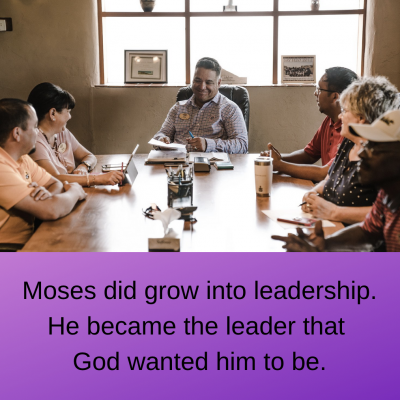Cooperating with other disciples means spreading God’s work around. Moses found that out. This devotion looks at the advice Jethro gave Moses and Moses’ response.
Nuggets
- Apparently, Moses’ father-in-law Jethro thought he was wearing himself thin.
- We have to give Jethro kudos for the advice he gave Moses.
- Moses accepted Jethro’s counsel because he knew he didn’t have a monopoly on God.

This year, we are looking at self-discipline. We are using Vincent’s The Lesson of Ripeness sermon to look at the need to grow in our relationship with God. We morphed learning enough to be a teacher into determining some areas we need to grow so we can be mature disciples.
Resource
We have been looking at solidifying what we believe. When we witness, we need to be prepared to explain what we believe and why we believe it. We have looked at the Scriptures; the Trinity (God, Jesus, and the Holy Spirit); man; salvation; grace; the church; divine ordinances; worship; God’s kingdom; end times; evangelism and missions; and stewardship. Now, we are going to look at cooperation.
Cooperation is an important aspect of being a disciple. We are to live in peace with each other.
That means we are to help each other. We need to share the work that God has for us.
Devotions in the What I Believe series
Devotions in the Cooperation category
Spreading the Work Around
Rebuilding Together under Difficult Circumstances
The Council Has Spoken
Coordinating Spiritual Gifts
Collecting for Others
Moses gave us a good example of cooperation. He was advised by his father-in-law on spreading out the workload. Let’s take a look.
Let's Put It into Context
The Merriam-Webster Dictionary defines cooperation as “the actions of someone who is being helpful by doing what is wanted or asked for” and “association of persons for common benefit.”
Resource
Problem Identified
“‘What you’re doing is not good,’ Moses’s father-in-law said to him. ‘You will certainly wear out both yourself and these people who are with you, because the task is too heavy for you. You can’t do it alone’” (Ex. 18: 17-18 CSB)
Do you know someone who has to do something all themself? Are you that person?
Moses took his leadership responsibilities for the Wilderness Wanderers very seriously. I know. They were his problem children. He thought he had to do so.
Apparently, Moses’ father-in-law Jethro thought he was wearing himself thin. Isn’t it nice to have family concerned about us? There had to be some affection there because Jethro did come visit him, and Moses received him.
Well. He probably was.
“The next day Moses sat down to judge the people, and they stood around Moses from morning until evening. When Moses’s father-in-law saw everything he was doing for them he asked, ‘What is this you’re doing for the people? Why are you alone sitting as judge, while all the people stand around you from morning until evening?’ Moses replied to his father-in-law, ‘Because the people come to me to inquire of God. Whenever they have a dispute, it comes to me, and I make a decision between one man and another. I teach them God’s statutes and laws’” (Ex. 18: 13-16 CSB).
You see, God wants us to work for Him. He doesn’t want us to be idle. Paul instructed us to “… warn those who are idle, comfort the discouraged, help the weak, be patient with everyone” (I Thess. 5: 14 CSB).
Moses was taking it to the other extreme. It may have been because there was just so many of them. Got Questions estimated the number to be 2.4 million all totaled. It was logical that more than a handful a day would have some kind of dispute.
But Moses wasn’t just being judge and jury. He told Jethro it was also his duty to “… teach them God’s statutes and laws” (Ex. 18: 13-16 CSB).
The boy was trying to do it all!
Oh, the Wilderness Wanderers needed taught. And remember, they hadn’t gotten the Ten Commandments yet, so nothing had been formalized yet.
The process was working. The Wilderness Wanderers were doing what they were supposed to be doing — inquiring of God. Moses was performing his duty of being the mediator for the people.
It was just too much.
Yes, God wants us to work, but He also wants us to rest. That is why He gave us the Sabbath. The Sabbath is a day of rest, not a day of business as usual.
We might look at this passage and question why God worked it out this way. If God gave him the work, shouldn’t Moses have been able to accomplish it?
Hughes gave us some insight into that. He wrote, “Good and righteous work may be too heavy for the best and strongest shoulders. Solitariness in dealing judgment may carry great weakness in it.”
God made us to be a community. He wants us to get past the old divisions and work as one to expand His kingdom.
Moses didn’t need to deal with the small matters all of the time. Others need the opportunity to apply what they have learned.
Excell made a great comment. He wrote, “Wicked men sometimes kill themselves by excess of pleasure. Good men should not kill themselves by excess of work even in the service of God.”
God isn’t necessarily looking for obsession. He is looking for balance.
Yes, God does want us to be committed. But “… my yoke is easy and my burden is light” (Mt. 11: 30 CSB). We shouldn’t be making it harder than it is.
Oh, yes. God is Sovereign God and doesn’t share the responsibilities of ruling. Jesus, however, came as a Servant Leader.
Advice Given
“Now listen to me; I will give you some advice, and God be with you. You be the one to represent the people before God and bring their cases to him. Instruct them about the statutes and laws, and teach them the way to live and what they must do. But you should select from all the people able men, God-fearing, trustworthy, and hating dishonest profit. Place them over the people as commanders of thousands, hundreds, fifties, and tens. They should judge the people at all times. Then they can bring you every major case but judge every minor case themselves. In this way you will lighten your load, and they will bear it with you. If you do this, and God so directs you, you will be able to endure, and also all these people will be able to go home satisfied” (Ex. 18: 19-23 CSB)
Okay. Wait a second. Cox brought up a good point.
Here is Moses. He was a prince in Egypt.
Here is Jethro. He was a man of the desert.
Wouldn’t we think Moses would be the leader, so he knew about division of labor and associates?
Maybe Moses was allowing Jethro to have his say because Jethro was his elder. But like we said, there had to be a relationship established between the two or Jethro wouldn’t have 1) come to visit or 2) felt that he could give advice.
Why was Jethro telling Moses what to do?
And why is Moses taking Jethro’s advice? Wasn’t he in direct contact with God? Wouldn’t God have told him personally if he wanted changes to be made?
But we have to give Jethro kudos for the advice he gave Moses. Let’s break it down.
Advice #1: Be choosy about the people who you pick. He suggested four qualifications.
• Have the ability to lead
• Are disciples of God
• Exhibit integrity
• Are not in it for dishonest profit
Advice #2: Have a tiered approach. They are to be placed over the people in groups of thousands, hundreds, fifties, and tens.
These magistrates would only get the small stuff. The big stuff would still come to Moses.
We’ve talked before how God talks with us. He does use others to give us His word. (Otherwise, why would we join a community of like-minded believers and listen to the pastor preach?)
Jethro did nail it when he realized that God talked to Moses. Moses was God’s go-to person in telling His Will to His people.
That was the best job for which Moses could have asked. Oh, no. He didn’t ask. He tried every which way to get God to choose someone else.
Moses did grow into leadership. He became the leader that God wanted him to be.
Moses just didn’t need to take the lead one every little thing.

Advice Accepted
“Moses listened to his father-in-law and did everything he said. So Moses chose able men from all Israel and made them leaders over the people as commanders of thousands, hundreds, fifties, and tens. They judged the people at all times; they would bring the hard cases to Moses, but they would judge every minor case themselves” (Ex. 18: 24-26 CSB)
Ooo, baby. Gibson just explained why Moses listened to Jethro. He knew he didn’t have a monopoly on God.
I know. It is probably easy for someone in a higher-up position (especially a paid higher-up position) to think their communications from God are more accurate than a lowly person’s communications with God.
Wrong. Remember, God doesn’t have favorites (Rom. 2: 11). God will tell each of us what He needs us to hear.

Making the Connections
• God wants us to work.
• God wants us to do His work.
• God has work for every one of His disciples to do.
• God wants us to work together.
• God has a hierarchy in place. We have to do our part.
• God doesn’t want us to burn out doing His work.
If we don’t do the work that God wants us to do – it is on us. If we are not allowed to do the work that God wants us to do because someone else thinks they must do everything – it is on them.
Making the Connections to Self-Discipline
Oh, man. How can this apply to self-discipline? It is interaction with others. It is leading others. That is tied up in self-discipline.
But how do we address questions raised about disciples taking advice from others? There has to be two different responses. We have to respond one way if the advice is biblical advice. We have to respond in a totally different manner if it is worldview advice.
We’ve been looking at defending our beliefs when we are witnessing. That means we have to be secure enough to convince someone to accept our beliefs.
Our questions should still serve us to determine on what we need to focus.
- What does the Scriptures say?
- What do I believe?
- Why do I believe the same/differently than the Scriptures?
- What are the talking points when witnessing to a non-believer?
Related Links
I have created a worksheet of the questions above. Click on the button below to access it.
How Do We Apply This?
If we are in a position of leadership, we need to engage our followers. We can’t make it just about us – even if we are just trying to make it easier for others.
We have to let them do their jobs for God. We have to let them grow as God wants them to grow.
Leaders have to let us do our jobs for God. They have to let us grow as God wants us to grow.
Isn’t that what cooperation is all about? We allow growth for the common benefit of God’s people. We don’t get an inflated ego or attitude because we think God should talk with us before He talks with someone else.
We praise God because He can use even someone as flawed as us to expand His kingdom. He gives us support in each other.
He loves us that much.
Father. You know what needs to be done. You know who You want to accomplish the task. You know who needs to be support people to accomplish that. We are in awe of how You work. Amen.
Don’t know what your spiritual gifts are?
Take this Spiritual Gifts Inventory
What do you think?
Leave me a comment below (about this or anything else) or head over to my Facebook group for some interactive discussion.
If you don’t understand something and would like further clarification, please contact me.
If you have not signed up for the email daily or weekly providing the link to the devotions and the newsletter, do so below.
If God has used this devotion to speak with you, consider sharing it on social media.
What a wonderful resource this post is, Elaine! I’m saving this and sharing it! Thank you for the effort you put into offering these resources!
Thank you so much, Stacey!